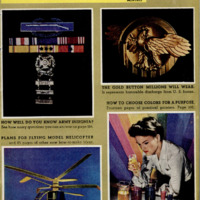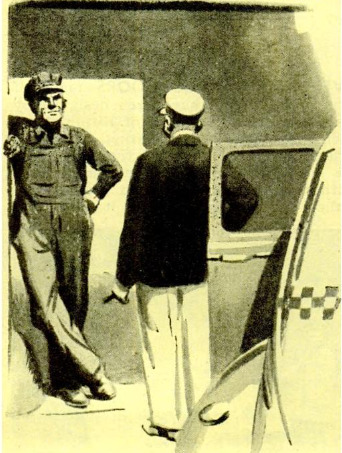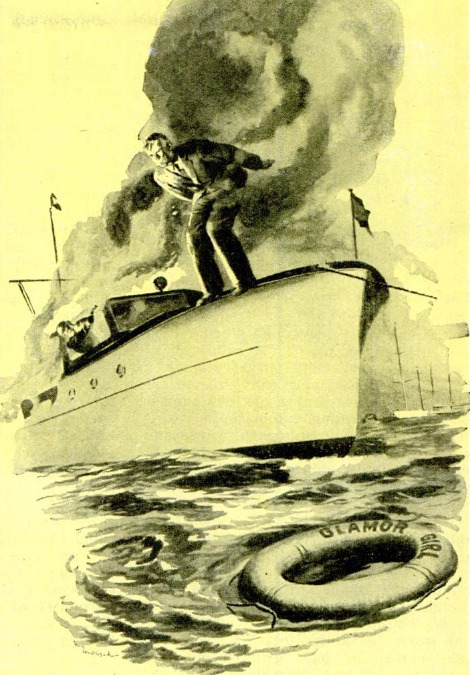-
Title (Dublin Core)
-
Guns gets into a tight spot
-
Article Title and/or Image Caption (Dublin Core)
-
Title: Guns gets into a tight spot
-
extracted text (Extract Text)
-
SEVERAL of us regulars were sitting
around the Model Garage shop watch-
ing Gus Wilson work when State
Trooper Jerry Corcoran came in and handed
him a newspaper clipping.
“News of your old friend,” he grinned.
Gus read the clipping and whistled softly.
“So they got him at last,” he said.
“Who got who?” somebody wanted to
know.
“The G-men got ‘Slicker’ Bailey,” Jerry
told him. “They've been after him for . . .
How long is it since your boat ride, Gus?”
“Seven years,” Gus replied. “Well, he
won't plan any more bank robberies. He
made a mistake trying to shoot it out.”
“Fatal,” Jerry agreed. “But he was the
smoothest caser in the business.”
“What is this?” Doc Foley demanded.
“What's a ‘caser’? And why is he Gus's
friend?”
“A caser,” Jerry explained, “is a fellow
who works ahead of a bank-robbing mob—
plans the stickups and getaways. As for
‘Slicker’ being a friend—Gus won't deny he
and ‘Slicker’ were once very close.”
“Too close for comfort,” Gus grunted.
“Remember the stickup of the First Na-
tional in Greenport Harbor?” Jerry went
on. “It was pulled on the Wednesday of
Race Week. They got 40 grand, and there
was only one clue—one of the mob appeared
to have an artificial arm. By Saturday we
didn't have a thing. Then Gus stepped in.”
“I was shoved,” Gus protested. “Forget
it”
Of course we wouldn't forget it, and be-
fore we went home we had the story—part
from Gus but most from Jerry. Here it is:
BEFORE the war even as industrious a
man as Gus could take time out to relax
Gace in a while, and he was doing just that
in the shop doorway late that hot Saturday |
afternoon when a Greenport Harbor taxi |
drove up. The man who got out was a
sporty-looking individual in ice-cream pants
and a brass-buttoned blue coat, and the
visor of his white-topped yachting cap was |
‘pulled down over a pair of penetrating gray
eyes.
"Fou look comfortable,” ho smiled.
Gus grinned back. “I was about to close.” |
“Know anything about marine engines?”
the visitor asked.
“Well,” Gus sald cautiously, “they're a
little out of my line. Greenport Harbor is
where you find the experts.”
“I just came from there,” the yachtsman
nodded. “Every mechanic in the place is |
up to his ears in work. And I want to be |
on my way tonight. My name's Gillingham
—J. C. Gillingham, Chicago. I've got a mo-
tor yacht over in the harbor. Been there all |
week watching the races. Last night my en-
gineer came aboard drunk, and I had to |
fire him. I don't know a lof about engines,
but once we get going I'll do all right. The
trouble is I can't get the engine started.
Drive over with me and start the engine,
and then name your own price.”
Gus hesitated, and Gillingham laughed.
“Be a good guy!” he urged, and Gus gave in.
Through the drive to Greenport Harbor
and during a good dinner at a roadhouse,
Gillingham talked familiarly of men Gus
knew to be prominent in the shore com.
‘munity.
“Most hospitable crowd I've ever run
into,” he declared. “Made me feel as much
at home in their club as I do in my own.
Even old Jonas Mandeville. When I dropped
in to see him about a little business matter, |
T figured he was just an-
other small-town banker, |
but after we'd talked for
half an hour he offered
me a guest card at his
golf club. Too bad his.
bank was robbed.”
It was evident when
they reached the yacht
club that Gillingham was |
popular there. He replied
Jovially to the hails of a
dozen or more members,
most of them dressed
exactly as he was, but he
kept on going. “Here's
my dinghy,” he said when
they reached the dock.
They got into the boat,
Gillingham spun the out-
board motor into activity,
and they put-putted down
the harbor past sleek tall-
masted racers and smart
power yachts that loomed
vaguely in the warm, |
growing darkness. Finally |
they came alongside a big
motor cruiser that lay at
the mooring buoy farthest
out. When they climbed
aboard, a man came along
the deck toward them.
“Fellow to fix the en- |
gine,” Gillingham told
him, and led the way into
a dimly lighted main cabin.
where three men were
playing cards. Their faces in shadow, they
stared silently. “Fellow to fix the engine,”
Gillingham said again, and Gus followed
him through a passageway, with closed
stateroom doors in the bulkheads at either
side, and into the engine compartment.
Gus took off his coat and went over the
engine. It was an old one that hadn't had
too good care, but there didn't seem to be
anything seriously wrong with it. After five
minutes of checking he found out why it
wouldn't start—the fuel-pump filter was
clogged. He cleaned it and asked Gilling-
ham to press the starter button. The engine
roared into life at once.
“That's fine,” Gillingham said. “I'l fix it
with one of the boys to take you ashore.
Be right back.”
“Tl have to wash up first.”
“Yes, of course,” Gillingham said over
his shoulder. “First door on your ——."
The cabin door slammed, and Gus didn't
hear the rest. He picked up his coat, went
into the passageway, and waited. After a
minute he got impatient and tried the knob
of a door. It turned, and: he pushed the
door open. A light was on, and he stepped
into a small stateroom. He looked around
for a wash basin—and his jaw dropped.
On top of the built-in chest of drawers
lay a human arm, its hand in a black glove!
Gus's heart skipped a couple of beats.
Then he grinned. It was an artificial arm,
of course. Then his heart skipped again as
he remembered something Jerry had told.
him—that one of the thugs who stuck up
the Greenport Harbor bank had an artificial
arm!
A rasping voice made him start. “What
are you doing in here?” A sallow, hard-
faced man was getting out of a bunk in
which he had been lying fully dressed. He
had only one arm—and in his lone hand he
held a wicked-looking automatic.
There were quick footsteps in the passage-
way, and Gus turned to see Gillingham, his
face’ still smiling but his gray eyes hard.
“I'm sorry,” Gus said. “I was looking—"
“You're going to be sorrier!” the one-
armed man grated. He, too, looked at Gil-
lingham, “No use trying to bull him,
Slicker.” He's wise—I seen it in hia eyes.
Get outa the way while I plug him.”
“We're still in the harbor, you hophead,”
Gillingham snapped. “When we get out-
side we'll drop him overboard—with some-
thing heavy tied to his feet.”
The one-armed man grunted grudging
assent, and he and Gillingham went out,
locking the door behind them.
Gus had good reason to be scared—and he
was, He sat on the bunk and tried to figure
a way out. Then he heard the engine start,
and in a short while the motion of the boat
told him they had reached open water.
There were cigarettes and a lighter on the
I bunk. He lit one and looked around. His
eye caught a small-diameter copper pipe
running along the bulkhead. He examined
it closely, and hope flared. “Looks like the
fuel line” he muttered. “If it is—" He
snapped the lighter and held its flame
against the pipe.
For what seemed like minutes nothing
happened. Then the engine stopped. Gus
grinned. “Thought so—vapor lock,” he
whispered. He kept the flame against the
pipe until he heard footsteps, and then he
sat quickly on the bunk. The door opened,
and Gillingham and the one-armed man
came in.
“Something's wrong again,” Gillingham
told Gus. “We'll make a deal. You get the
engine running, and keep it running, and
we'll put you ashore safe and sound.”
“All right,” Gus said. “I'll do it.”
With the one-armed thug at his heels, he
followed Gillingham into the engine com-
partment. After faking a quick examina-
tion, he told Gillingham to press the starter
button. He did, but nothing happened.
“Wait a minute,” Gus said—and he no-
ticed that Gillingham left the ignition on.
He disconnected the fuel line, primed the
carburetor with enough gas to run the en-
gine for 10 or 15 seconds, and set the throt-
tle wide open. Now he was sure that enough
time had passed for the vapor lock to have
cleared away. He pointed the disconnected
end of the fuel line at a spark plug and
said: “Try again.”
Gillingham pressed the starter button.
Gas spurted on the spark at the plug
and instantly there was a flash of blinding
flame. Gus jumped backward and crashed
into the bulkhead. Fresh gas, pumped
through the disconnected fuel line by the
racing engine, burned viciously. Gus picked
himself up to grope his way to the deck.
Someone yelled, and an automatic cracked.
Gus leaped across the deck, wrenched free
a life ring lashed to the rail, threw it far,
and dived.
He stayed under water as long as he
could. When he came up the crulser was
blazing from stem to stern. He saw the
life ring a dozen yards away, swam to it,
and worked his way out of the glare of the
burning boat. Half an hour later he was
picked up by ome of the motorboats ate
tracted by the fire.
OC whistled, “What's the end?"
D “This is the end,” Jerry said, holding
up the news clipping. “What was left of the
one-armed thug and one of his pals was
found on the boat. Two others got away in
the dinghy, but we were waiting for them
when they landed. Both had big rolls, and
they squealed on ‘Slicker’ Bailey.
“Gus's story was kept out of the papers
80 ‘Slicker’ —if he was alive—wouldn't find
out he'd been squealed on. He was alive all
right—he could swim like a fish. And pretty
s00n some more bank jobs turned up that
he might as well have signed his name to.
But he was slick, and it took the G-men
seven years to catch up with him.”
“Yes,” Gus said, “they always get their
man, though. But since you fellows took to
making a club out of this shop, I never get
a decent dinner—I always get down to the
Park House after the meat's gone, Scram!”
-
Contributor (Dublin Core)
-
Martin Bunn (article writer)
-
Language (Dublin Core)
-
Eng
-
Date Issued (Dublin Core)
-
1945-10
-
pages (Bibliographic Ontology)
-
138-140
-
Rights (Dublin Core)
-
Public domain
-
Archived by (Dublin Core)
-
Sami Akbiyik
 Popular Science Monthly, v. 147, n. 4, 1945
Popular Science Monthly, v. 147, n. 4, 1945




